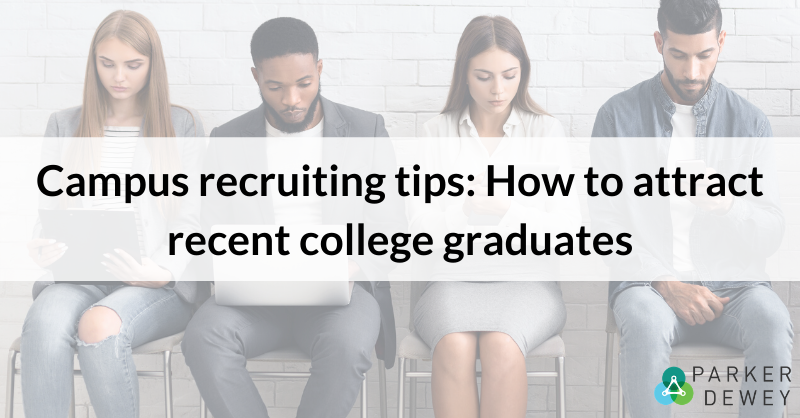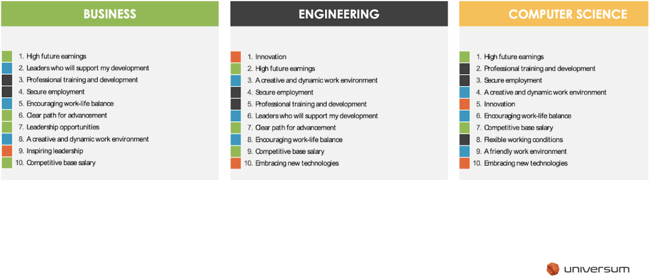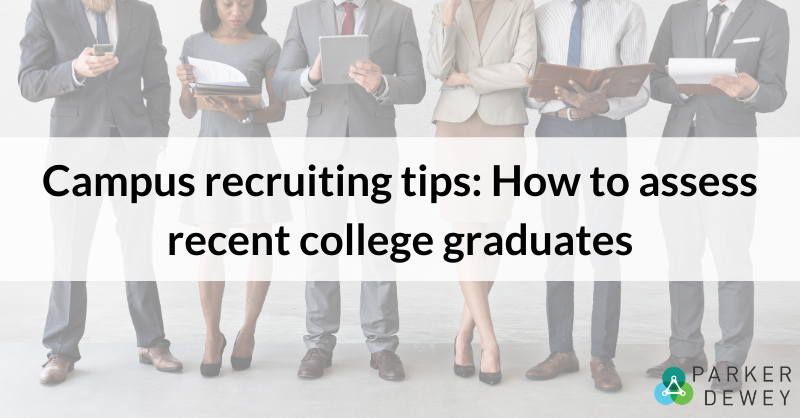
Campus Recruiting for Better Talent Acquisition Part 1: How to Attract Recent College Graduates
As the newest talent pool enters the workforce with different interests and values than previous generations, identifying and pivoting your recruiting efforts to appeal to new candidates can yield successful results.
Hiring recent graduates is important to any team of your business or organization because they are eager to work, learn, and bring in fresh perspectives. To help you adjust, we want to share ways you can update your recruiting process at the attraction and sourcing phase of the talent acquisition funnel and the research behind it.
The class of 2020 is a unique group of graduates navigating through uncertain economic and cultural impacts. This article is meant to help you gain an understanding of who they are and what they are looking for as they search for career pathways that support their individual and collective priorities.
| For the most recent statistics on Generation Z and what they are looking for when searching for career opportunities, read our full summary of the Reinventing University Recruiting webinar. |
Attracting college graduates
When attracting new candidates, it’s easy to spend a lot of your budget on online ads and career fairs, but making sure that students understand what your company has to offer is crucial to gaining Gen Z applicants. Here’s why: Candidates are seeking credible intel on what a company is really like.
Candidates use an average of 5.9 different channels to find information about employers. They want to know whether a company sticks true to its messaging and promises made to employees. Unlike Millennials, Gen Zers are not as consistently driven by the purpose of a brand, so spending on employer branding needs to be strategic to cut through the noise.
This also indicates that it’s important to be transparent and consistent with your messaging across the board. Offer more than a simple claim to show candidates what life is like at your company. This kind of cohesiveness and clarity linked with employer branding helps you to demonstrate your corporate values when attracting recent graduates.
What is employer branding?
Employer branding helps you manage your reputation as a place of work. Successfully marketing your employer brand is essential to putting yourself on the map to attract, retain, and know that you are gaining the right talent. Satisfaction on both sides means a better retention rate. Keep in mind that talent is looking for more than just monetary incentives - they also want a place to grow professionally and feel supported by their colleagues.

(Across these three industries, the top priorities for college students besides high future earnings are professional training and development, and secure employment.)
Branding has become more pertinent in the recruiting process as students may already be aware of your company from the consumer-facing aspect. Their familiarity draws them into the first steps of an application process, but while this consumer-facing halo makes it easy to leverage when you want to attract, it is not effective as a long-term strategy.
To capture qualified or interested talent, emphasize opportunities that align with their priorities, such as continuous learning and job security. Address their pain points, the opportunities they’re looking for, and support these attraction factors throughout the entire candidate experience to have more success at attracting qualified candidates and retaining them.
What you should know as a well-known brand
If you are a well-known company or brand, you may be top of mind for early student candidates, so your attraction rates are well established. On the other hand, there may be students who feel that they do not belong or fit in with your organization. This means that these students don’t apply to a company or role because they don’t have enough information to tell them otherwise. They might know about your company and what you stand for, but how would they know if they’re a good fit? This is a good reason to consider ways that you can overcome and address some of the preconceived notions potential candidates have about your organization.
Addressing preconceived notions
Addressing specific pain points and attraction factors of your candidates can help them see a future within your organization. Many employers are now “reinventing the info session” to tackle this. A few common tactics are sharing skill-building content for students from all areas of study, hosting career treks, and attracting students from diverse backgrounds and locations with Micro-Internships. (According to a study done by iCIMS, 37% of graduating seniors evaluate an employers’ diversity and inclusion initiatives when considering a job.) You can even address preconceived notions by hosting specific career development discussions, rather than a typical information session, and host discussions on various career development topics with your brand as subject matter experts to demonstrate your commitment to learning.
Aside from the group that feels they will not fit the cookie-cutter requirements to work for your company, other candidates may have the assumption that working for your company or industry is the best option for them, yet once presented with the opportunity, realize the reality is not as appealing. To engage this group authentically, it’s important to share specific and educational information about your brand or what the role entails to address any preconceptions. Micro-Internships in particular help a student to experience real-work at your organization and see how their skills and background can fit.
What about companies that are not well-known?
If your organization is not a household name, it is still important to develop an employer brand that drives attention and attracts candidates that want to build a rewarding career. On the plus side, you won’t have students that feel like they won’t fit in because they are probably not part of your consumer market and aren’t as likely to have preconceived notions. However, you may encounter challenges in your messaging when expressing what your company does to support the growth of candidates and why they should apply to work for you. Regardless, your branding efforts can help you win a competitive advantage when looking to gain the attention of the right employees.
Attract authentically
Whether you are a well-known brand or not, allow students to engage with your company and the role they are applying for in an authentic way. This can be done through workshops and short-term projects, such as Micro-Internships. Assessment of their skills and interest at this level can lead to less attrition, better retention, and fewer reneges because these opportunities address questions that traditional methods of recruiting may not answer. Approaching attraction on this level can help you build your talent pipeline by attracting qualified candidates that show their skills, and prove a mutual interest.
To learn about some of the innovative strategies that companies are using to attract students, watch the replay of our Reinventing University Recruiting webinar.





